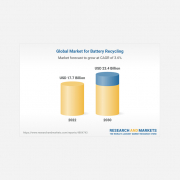Global Black Mass Recycling Market Set to Surge
USA-based market research and consulting firm InsighAce Analytic has released a market assessment report on the global black mass recycling market.
“Black mass” is the industry term used to describe a type of e-waste comprising crushed and shredded end-of-life batteries, which contains mixtures of metals including lithium, manganese, cobalt and nickel. According to InsighAce Analytic, this market is estimated to reach more than 51.22 billion US-Dollar by 2031, exhibiting a compound annual growth rate (CAGR) of 20.74 percent during the forecast period.
“Black mass recycling has a significant industry impact since it offers several economic and environmental advantages,” the company gave account. “Also, it has a considerable impact on end-use industries since it offers a variety of advantages that can boost their productivity, reduce their expenses, and give them a reliable source of essential metals.” The market for recycling black matter would be expanding on a global scale. “In the upcoming years, new trends are also anticipated to offer opportunities for the market to expand, including rising investments in recycling technologies, increased demand for second-life batteries, changes in business models caused by climate action, rising demand for lithium-ion batteries and raw materials throughout the value chain, and advancements in economic and environmental technologies.”
However, there are also challenges. The most difficult stage in the recycling process is the hydrometallurgical step. The non-uniform composition of dark matter is one issue. Depending on the battery’s usage history and the battery chemistry used by each manufacturer, various degraded compounds may be present, the market research company described the situation. The hydro-process had to be extremely reliable as a result. “Reaching battery grade qualification even with great effort is difficult, if not economically impossible. Yet, a lot of recycling process inventors assert that their recycled products may meet battery-grade criteria. This begs the obvious issue of why lithium has not yet been recycled into new batteries. Results obtained at the bench under ideal circumstances are simply not applicable to industrial-scale recycling. Hence, the factors mentioned above are acting as a challenge for the market’s growth.”
www.insightaceanalytic.com/customisation/1680
(Published in GLOBAL RECYCLING Magazine 2/2023, Page 13)







